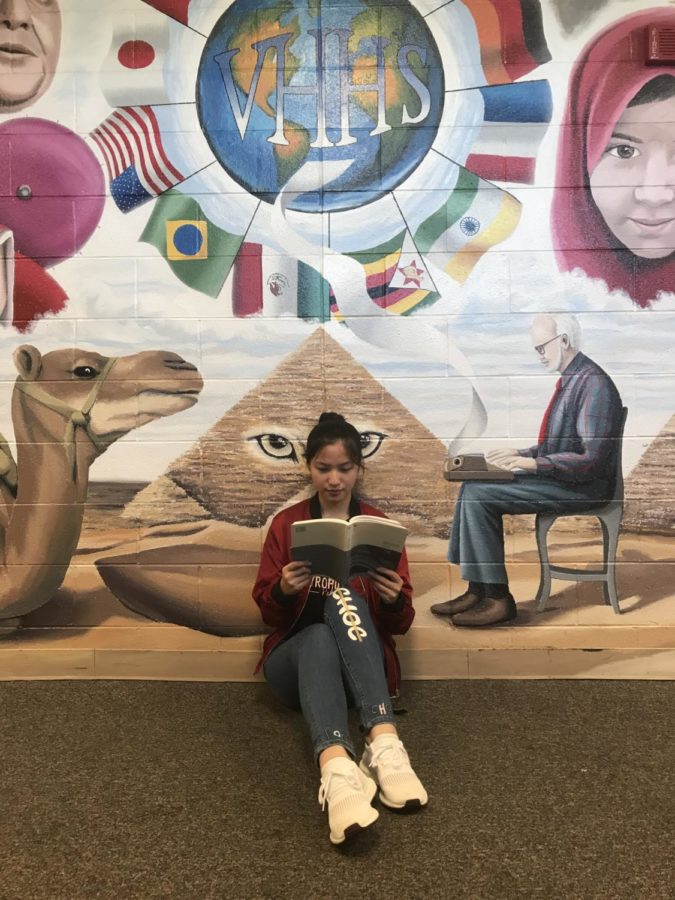International students adjust to life at VHHS
Get to know some of the new faces at VHHS, who have moved from outside of the USA
Keija Li sits in front of a school mural. This summer, she moved from China to Vernon Hills.
Welcoming new students from around the world
VHHS is known for its diverse student body and staff. The high school houses students from multiple countries, ethnicities and cultures. In addition to French, Spanish and German classes offered at school, VHHS students speak others such as Russian, Arabic, Ukrainian and Korean.
Most students moving to Vernon Hills from outside of the country do so because of their parents’ work. This year alone, there are six new international students.
From lockers to schedules, school systems outside the United States can vary greatly. While small things such as a locker can be habit to high schoolers, some international schools have a different way of doing things.
Ms. Meister-Louria, the ELL teacher at VHHS, described a common difficulty of international students.
“They have only seen [lockers] in the movies, so we have to teach students how to use lockers,” she explained.
Another difference is the struggle of calculators. While some students have used them before, others have been taught to do math with pencil and paper. Many international students are capable of doing advanced math, but struggle to do it using calculators in VHHS classes, according to Ms. Meister-Louria.
Kejia Li enjoys art classes at VHHS
Li and her family flew about 7,000 miles from China to Vernon Hills this past summer. 14 hours later, they landed in Vernon Hills, their new home.
With cultural and academic differences, Kejia Li (9) has found something to hold on to from China to Vernon Hills: Art. Her Art Expo class provides a break from the challenging school day of an international student.
Li said there are many differences between her old art classes in China and her new one at VHHS, such as only having art twice a week in China but daily at VHHS. She enjoys being able to do something she loves.
“It makes me feel relaxed and free. That is why I like art.” Li said.
While Li said academic classes here as much easier than in China, she struggles with the shift to English, like most international students. Although she has studied English in her past schools, Li said she finds it hard to speak English all day.
Her overall impression of Vernon Hills and the high school has been positive.
“[VHHS] is a beautiful and magical place with many relaxing classes and kind people,” she said.
Shkolnik twins adjust to new school system
Natalie Shkolnik and her twin brother Adam (9) have traveled to Vernon Hills a few times to visit their grandparents. This summer, they repeated the 13-hour flight from Israel to permanently move to Vernon Hills.
Shkolnik’s parents made the decision to move here and although she wasn’t sure at first, Shkolnik’s opinion soon changed. She now enjoys the atmosphere at VHHS, including the helpful teachers and friendly people.
At her old school, she was required to wear a uniform — a shirt with the school logo on it. Shkolnik wasn’t a fan of school uniforms and enjoys picking what she wears to school at VHHS.
Most schools in Israel offer students English classes at the start of third grade. Although Shkolnik is able to speak English clearly, she still thinks it is difficult.
“It’s really exhausting — too much English,” she said.
She also expressed her frustration with homework, as it can get too difficult sometimes. Shkolnik hopes her teachers continue to be flexible and help her to do her best in school.
Anastasiia Popovych adapts to schedule differences
It is 30-minutes until departure, and the Popovych family hasn’t found their gate. They rush around the airport and ask for help, but struggle to understand the staff’s accent. Luckily another traveler nearby notices their Russian and helps guide them, just in time to catch their 12-hour and 5,000 mile flight.
This past July, Anastasiia Popovych (12) and her family made this trip from Ukraine to Vernon Hills.
Popovych started learning English in fifth grade, but struggles to speak it during the entire school day, as she is not used to it. She has found a convenient solution to getting stuck, Popovych easily translates Ukrainian/Russian into English on her phone.
Another adjustment she has had to make is the difference in school systems. Popovych is used to wearing daily uniforms and attending different classes on specific days, like gym only twice a week. This gave her the opportunity to take 23 classes during the school year.

